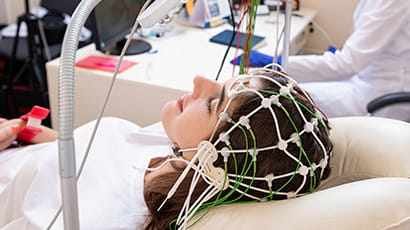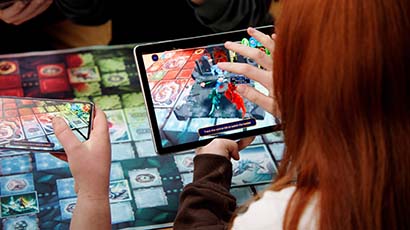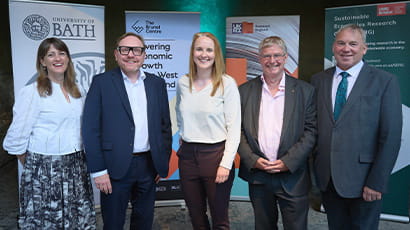Mixed Reality and AI to aid surgeons with keyhole heart valve surgery

Cardiac surgeons could in the future be conducting procedures virtually before even stepping into an operating theatre, thanks to research at UWE Bristol’s Big Data lab and Faculty of Health and Applied Sciences (HAS). The team is developing technology that uses artificial intelligence (AI), augmented reality (AR) and virtual reality (VR) to assist cardiac surgeons in planning and preparing for complex keyhole heart valve surgery.
UWE Bristol researchers are initially collaborating with the Bristol Heart Institute (BHI), aSpecialist Research Institute at the University of Bristol, whose surgeons will test the system when preparing for minimally invasive cardiac valve surgery (MICVS).
Compared to conventional open-heart surgery involving cutting through the breastbone to reach the heart, MICVS is less intrusive as the heart is accessed through smaller incisions using endoscopic instruments. And patient recovery time is generally quicker after this keyhole surgery. However, MICVS is complex and requires hours of pre-operative planning and preparation.
Dr Hunaid Vohra, Consultant Cardiac Surgeon and Honorary Senior Lecturer and Researcher at the BHI, who is collaborating with UWE Bristol, said: “In the operating room, despite pre-planning, it is currently very common to find unexpected challenges, as every patient’s height, weight and heart-lung anatomy is different. And patients’ frailty varies.
“Mixed Reality and AI will enhance our ability to prevent the conversion of a keyhole heart valve operation to an open heart surgery, avoiding two sets of scars and delay in recovery.”
Surgeons will initially be able to use the system’s AI to tap into the patient’s medical data to predict the risks associated with the procedure. The likelihood of adverse events is then presented to the surgeon on a HoloLens using AR.
Next, the surgeon will have access to AR technology to show a patient a 3D version of their heart and explain the procedure to them via headsets.
Dr Muhammad Bilal, Associate Professor of Big Data and Artificial Intelligence at UWE Bristol and leading the research team, said: “Most terms surgeons use to describe heart surgery during consultation draw a blank from patients and this system makes the explanation task much clearer and easier.”
Incorporated in the system is also a pre-operative logistics element that optimises operation planning. This will assist medical teams in preparing the right instruments and materials, and booking the appropriate operating theatre and hospital beds, among other tasks.
Crucially, the software’s virtual planning feature will provide surgeons with access to a complete digital version of the patient, enabling them to perform the entire operation beforehand on a replica of the patient’s thoracic cavity. This will include ‘what-if’ scenarios to determine the most optimal and personalised surgical strategies.
Finally, in collaboration with UWE Bristol’s Centre for Print Research, surgeons performing very complex cases will be allowed to order a bespoke 3D printed model of the patient’s thoracic cavity mimicking organs, veins, and blood flow to simulate the procedure on a synthetic body.
“This will enable us to practise before the actual operation and minimise the potential for things to go wrong on the day,” said Dr Vohra. “Overall, we are excited to be involved in this technology, which could spell the future for highly successful minimally invasive procedures of this type in patients of all ages.”
Dr Bilal added: “Currently, the practice of MICVS is limited to a small group of surgeons in the world. This technology-enabled guidance promises to increase the number of doctors able to perform these operations, providing wider access to the general population.
“There are significant engineering challenges to be resolved before this technology can be rolled out into the NHS but our collaboration with the BHI provides a perfect testing ground.”
Related news

12 December 2025
UWE Bristol’s environmentally conscious and student-focused accommodation wins three awards
Purdown View, the world's largest certified Passivhaus student accommodation development, has been recognised at Property Week Student Accommodation Awards.

25 November 2025
Health-tech start up MyCelsius launches breakthrough cooling tech for hot flushes developed at UWE Bristol’s Launch Space
A pioneering Bristol-based health-tech company developing cutting-edge cooling technology for hot flushes has credited UWE Bristol’s Launch Space incubator with playing a key role in accelerating its product development.

14 November 2025
Lecturer wins prestigious Times Higher Education award for innovation in teaching
A senior paramedic science lecturer at UWE Bristol has been named the most innovative teacher of the year in the Times Higher Education Awards 2025.

13 November 2025
Alliance Medical and UWE Bristol launch UK’s first PET-CT postgraduate certificate
In a move set to transform imaging education, Alliance Medical (AML) and UWE Bristol have joined forces to co-design and develop the UK’s first PET-CT Postgraduate Certificate (PG Cert).

13 November 2025
New AI research to revolutionise animal welfare
A UWE Bristol research project will combine behavioural science and AI to create technology that understands not only what animals do, but how they feel.

29 October 2025
UWE Bristol academic unveils breakthrough in energy-efficient AI at NATO science forum
Dr Jonathan Lancelot has developed a new form of AI that could transform how intelligent machines operate in space, defence, and remote environments.

07 October 2025
Academic playing role in project to find hidden graves in Mexico using drone technology
A UWE Bristol lecturer is playing a part in a project using drone technology to locate concealed graves in Mexico.

01 October 2025
New funding for researchers to develop trustworthy clinical AI for assessing brain activity
Researchers have received funding from UK Research and Innovation to help bring their innovative brain-monitoring AI technology closer to real-world use.

11 September 2025
New study to investigate augmented reality as an intervention for emotionally based school avoidance
A UWE Bristol researcher will support a new study exploring whether an augmented reality board game can help young people with emotionally based school avoidance (EBSA).

22 August 2025
A decade of Future Space: How UWE Bristol’s enterprise zone is powering innovation and economic growth
Tracey John, Director of Research and External Engagement, reflects on the impact of Future Space and its role as a launchpad for cutting-edge companies shaping the future of how we live and work.

11 July 2025
Wound dressings developed with support from UWE Bristol to be launched by global firm
Technology that a team of UWE Bristol scientists helped develop to aid the healing of chronic wounds will be used in new ‘smart dressings’ being launched by global medical company.

03 July 2025
Research lab The Brunel Centre opens to power sustainable and inclusive growth for the West of England
A new data and research centre designed to support sustainable and inclusive growth and industrial strategy in the region, has officially launched.






